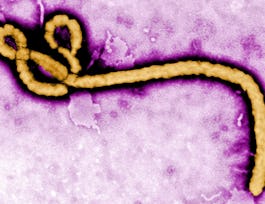This course introduces learners to a variety of infectious diseases using a patient-centered, story-based approach. Through illustrated, short videos, learners will follow the course of each patient’s illness, from initial presentation to resolution. Integrating the relevant microbiology, pathophysiology and immunology, this course aims to engage and entice the learner towards future studies in microbiology, immunology and infectious diseases.


Stories of Infection
Taught in English
Some content may not be translated
49,352 already enrolled
(1,720 reviews)
Skills you'll gain
Details to know

Add to your LinkedIn profile
32 quizzes
See how employees at top companies are mastering in-demand skills


Earn a career certificate
Add this credential to your LinkedIn profile, resume, or CV
Share it on social media and in your performance review

There are 6 modules in this course
In Module One, we will begin to hear how some microbes cause disease in humans. We will familiarize ourselves with the human immune system, including the cells that make up the innate and adaptive immune responses. We will also examine the relationship between socioeconomic conditions and infectious disease as we explore the story of one person’s experience with cholera. By the end of this module, learners will be more familiar with how the host immune defenses actively defend the body against disease-causing microbes. After each lecture, there is a glossary of terms pertaining to that lecture, which will assist learners in answering the quiz questions. Learners can also find a glossary of all terms from the course, listed alphabetically, under the "Resources" tab.
What's included
3 videos3 readings3 quizzes
In Module Two, we will explore six infectious diseases caused by bacteria. We will see how factors like agricultural practices, prior infections, smoking history, and financial situations can play a role in infectious disease. By the end of this module, learners will be able to interpret the clinical presentation of these six infectious diseases and describe the relevant microbiology, pathophysiology, and immunology.
What's included
6 videos6 readings6 quizzes
In Module Three, we will explore seven additional cases of infectious disease involving bacteria. We will see how a timely and accurate diagnosis can be vital for a patient's survival. By the end of this module, learners will be able to interpret the clinical presentation of these seven infectious diseases and describe the relevant microbiology, pathophysiology, and immunology.
What's included
7 videos7 readings7 quizzes
In Module Four, we will explore five cases of infectious disease involving viruses. We will see how factors like social stigma, prior infections, access to medications, and family history can play a role in infectious disease. We will also examine the link between viruses and some cancers. By the end of this module, learners will be able to interpret the clinical presentation of these five infectious diseases and describe the relevant microbiology, pathophysiology, and immunology.
What's included
5 videos5 readings5 quizzes
In Module Five, we will explore five additional infectious diseases caused by viruses. We will also apply our knowledge of the immune system to explore the use of vaccines, and understand the history of the MMR vaccine. By the end of this module, learners will be able to interpret the clinical presentation of these five infectious diseases and describe the relevant microbiology, pathophysiology, and immunology.
What's included
5 videos5 readings5 quizzes
In Module Six, we will explore six cases of infectious disease caused by mites, protozoa, tapeworms, fungi, and tick-borne bacteria. We will also examine how arthropods like mosquitos and ticks can spread disease. While most of these diseases are caused by infectious pathogens other than viruses and bacteria, learners will be able to apply their knowledge of immunology and microbiology to understand and interpret the clinical presentation of these six infectious diseases.
What's included
6 videos6 readings6 quizzes
Instructor

Offered by
Recommended if you're interested in Public Health

Coursera Project Network

Tecnológico de Monterrey

Emory University

Tecnológico de Monterrey
Why people choose Coursera for their career




Learner reviews
Showing 3 of 1720
1,720 reviews
- 5 stars
87.86%
- 4 stars
10.62%
- 3 stars
1.10%
- 2 stars
0.23%
- 1 star
0.17%
New to Public Health? Start here.

Open new doors with Coursera Plus
Unlimited access to 7,000+ world-class courses, hands-on projects, and job-ready certificate programs - all included in your subscription
Advance your career with an online degree
Earn a degree from world-class universities - 100% online
Join over 3,400 global companies that choose Coursera for Business
Upskill your employees to excel in the digital economy
Frequently asked questions
Access to lectures and assignments depends on your type of enrollment. If you take a course in audit mode, you will be able to see most course materials for free. To access graded assignments and to earn a Certificate, you will need to purchase the Certificate experience, during or after your audit. If you don't see the audit option:
The course may not offer an audit option. You can try a Free Trial instead, or apply for Financial Aid.
The course may offer 'Full Course, No Certificate' instead. This option lets you see all course materials, submit required assessments, and get a final grade. This also means that you will not be able to purchase a Certificate experience.
When you purchase a Certificate you get access to all course materials, including graded assignments. Upon completing the course, your electronic Certificate will be added to your Accomplishments page - from there, you can print your Certificate or add it to your LinkedIn profile. If you only want to read and view the course content, you can audit the course for free.
You will be eligible for a full refund until two weeks after your payment date, or (for courses that have just launched) until two weeks after the first session of the course begins, whichever is later. You cannot receive a refund once you’ve earned a Course Certificate, even if you complete the course within the two-week refund period. See our full refund policy.

